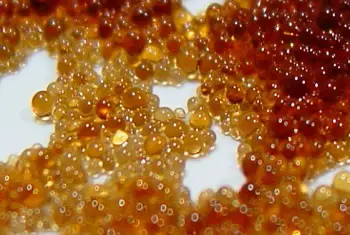UPDATED: March 19, 2022
You may have heard that a Brita water filter can remove unwanted impurities in your drinking water that will make it taste better and even remove odors that could be in your water. But does a Brita water filter remove valuable minerals from your drinking water?
A Brita “STANDARD” filter contains an ion exchange resin that can remove certain minerals like copper, zinc, and cadmium from your water. A Brita “STANDARD” filter does NOT remove all minerals from water and may not remove any of the minerals contained in your water.
Brita “Standard” water filters’ primary filtering media is activated carbon to reduce or remove impurities that may affect the taste and odor of drinking water, but they also are able to reduce or remove “SOME” minerals from your water.
Here’s What We Will Be Covering:
- What Minerals Are Removed By A Brita Water Filter?
- How Does A Brita Filter Remove Minerals From Water?
- Does A Brita Filter Remove All Minerals From My Water?
- Do All Brita Filters Remove Minerals From Water?
- Can Minerals In My Water Damage My Brita Water Filter?
- Do Brita Filters Add Any Minerals To Water?
- How Can I Add Minerals To My Brita Filtered Water?
What Minerals Are Removed By A Brita Water Filter?
Although a “Standard” Brita water filter is able to remove some minerals from water, its ability to remove minerals from water is limited to just a few common minerals like copper, zinc, and cadmium.
| What Brita® Reduces or Removes from Tap Water | Longlast Filter | Standard Filter | Stream Pitcher Filters | Bottle Filters | Faucet Filters |
| Chlorine (Taste & Odor) | Yes | Yes | Yes | Yes | Yes |
| Lead | Yes | Yes | |||
| Mercury | Yes * | Yes | |||
| Cadmium | Yes | Yes | |||
| Benzene | Yes | Yes | |||
| Asbestos | Yes | Yes | |||
| Particulates | Yes | Yes | Yes | Yes | |
| Class I | Class VI | Class VI | Class I | ||
| Copper | Yes | ||||
| Zinc | Yes | ||||
| 1, 2, 4 – Trichlorobenzene | Yes | Yes | |||
| TTHMs, Giardia, Atrazine, Lindane, and Trichloroethylene (TCE) | Yes | ||||
| Other contaminants | Yes | Yes |
* Only on some systems.
How Does A Brita Filter Remove Minerals From Water?
Just like a water softener uses an ion exchange resin to remove hard minerals like calcium and magnesium, a Brita “Standard” water filter uses a similar resin to remove some minerals from water but it does NOT remove a significant amount of calcium and magnesium (Hardness) from your water.

Copper and zinc in your drinking water can cling to the ion exchange resin inside of a Brita water filter, reducing or removing them from your water.
At some point, this ion exchange resin will reach its capacity and no longer be able to remove more minerals from your water.
Because a Brita water filter does NOT regenerate its ion exchange resin like a water softener, at this point, copper, zinc, and other minerals will remain in your water after it has gone through your Brita water filter.
Does A Brita Filter Remove All Minerals From My Water?
A Brita filter removes very few minerals from most water. The amount of ion exchange resin used in a Brita “Standard” water filter is NOT enough to remove a high amount of minerals from your water during the recommended life of the filter cartridge.
Considering a Brita water filter for reducing sodium in your water? See my article “Does A Brita Filter Remove Sodium?”
Also, the ion exchange resin used in a Brita “Standard” water filter is primarily meant to be used for the reduction of copper, zinc, and cadmium and NOT for the reduction of all minerals that are commonly found in residential water.
Do All Brita Filters Remove Minerals From Water?
Only the “Standard” Brita water filter cartridge contains an ion exchange resin to reduce the amount of copper, zinc, and cadmium in your water.
The Brita “Long Last”, Stream filters, Bottle filters, and Faucet filters do NOT contain an ion exchange resin to reduce the number of minerals in your water.
Can Minerals In My Water Damage My Brita Water Filter?
Certain minerals that are common in residential water can collect inside of a Brita water filter and cause it to lose effectiveness over time.
But because it normally takes a considerably longer amount of time for this to happen than the recommended life of the filter cartridge, minerals in your water will generally have no effect on a Brita water filter cartridge.
Do Brita Filters Add Any Minerals To Water?
Brita water filters do NOT contain minerals that are intended to be added to your drinking water.
The carbon and ion exchange resin are NOT meant to be added to your drinking water, they are only meant to remove impurities from your drinking water to improve the odor and taste.
How Can I Add Minerals To My Brita Filtered Water?
In order to add beneficial minerals to increase the pH of your drinking water, you would need to use an “Alkaline Water Pitcher” which contains minerals that get added to your water.
You can also add a pH-increasing water filter directly to your tap water for better-tasting alkaline water from your faucet.
This article was originally posted on freewateradvice.com on 2/6/2022
To Sum Up!
A Brita “Standard” filter cartridge does contain a small amount of ion exchange resin to reduce the number of minerals from your water. (Source)
Not all Brita water filter cartridges contain ion exchange resin and are NOT meant to remove any minerals from your drinking water.
Brita water filters are meant to reduce impurities in your drinking water to make it taste better and remove odors from your water to make it more enjoyable.




Why is my Brita Longlast filter left behind white substances after I boiled the water?
Hello Jason and thank you for the question.
A Brita filter contains grains of carbon to remove gasses and tiny particles that can affect the taste and odor of your water.
The white substance that you are describing sounds to me like either calcium (contributes to hard water) or salt that was dissolved in the water and remained after boiling the water.
A (White) Brita filter contains a small amount of resin that can remove a very small amount of minerals but not enough to soften average water. The Brita Longlast filter only uses a carbon-based filter that is not designed to remove hardness or sodium which would remain after boiling the water.
To be sure, you can contact a local water testing laboratory to have your water tested in more detail.
I hope this was helpful.
Paul